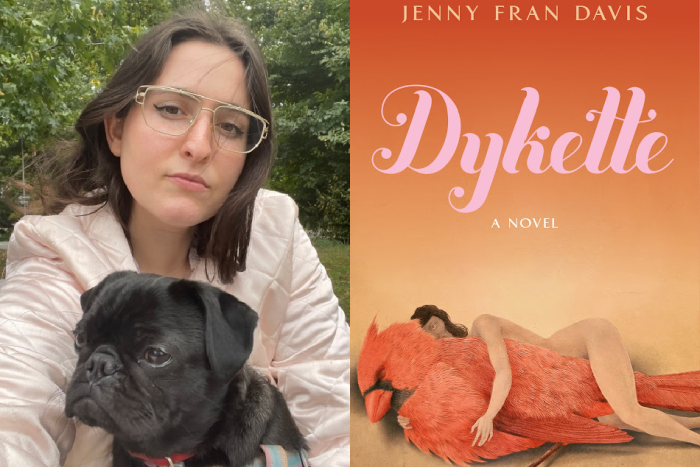The way the desks had been arranged in Maurice’s classroom, I couldn’t find a place for myself. There were twenty-five spots, yet as soon as I approached any one chair, I’d see that it’d been reserved already, by the placement of a notebook or bag on top. It occurred to me that the number of chairs and desks might correspond exactly to the number of registered students. People milled around and talked to each other. They seemed to possess a mingling skill gleaned from an earlier university class. The room was not large, it was not a lecture hall, but it had tall ceilings, moulding engraved with fleurs-de-lis, and grand, vast windows. At the front of the room stood a massive wooden table that appeared screwed in place, right into the fat, lacquered floorboards. A grandfatherly man sat in the back row, reading a book of Maurice’s poetry titled Get Away. I knew he was what was called a “mature student,” pursuing coursework to stave off the boredoms of senior life. I veered toward him, feeling we could silently bond over our shared outsider status. But once I sat in the seat next to his, having pushed its notepad and pen off, he shot me a disapproving look, then scanned the room ostentatiously, to scare me into believing he would actually report me to the owner of that pen and notepad. He quit after a few seconds and returned to his reading, but any confidence I’d talked myself into having that morning was gone. What a horrible old man, I thought. What a humourless, un-Maurice-like shitbag.
That morning I’d sat on the couch for some time until I experienced a proper realization that this was the morning of Maurice Blunt’s class, that he and I would be meeting up again and having some sort of conversation. From that moment on, my stomach clenched, and I spent a while on the toilet, where I reread Maurice’s poetry book. When I was done, I had the idea to do more research on him before class. I got dressed and walked to the closest public library, a small postmodern building shaped like a clamshell. Inside, I sat at the last empty computer and logged on to the library catalogue. There was nothing with “Maurice Blunt” in it. I opened the internet browser and typed his name into the search bar. A short list of links appeared. The first item was a fan page called “The #1 Maurice Blunt Fan Page.” The wallpaper on the homepage was the CBGB logo, repeated in a mosaic. Below the title, and barely legible because of all the CBGBs, it said, “The most underappreciated genius to have come out of 70s nyc.” And below that: “Enter.”
I clicked on “Enter” and the cursor turned into an hourglass. Once the page opened, it displayed a black background with a yellow construction sign in the centre. “Come back soon,” it said beneath.
I returned to the search results and opened the second link, an interview on the website of an independent record label out of Madison, Wisconsin, called Hectic Aura. They’d released Maurice Blunt’s CD six years prior, in 1992. The interviewer asked Maurice about his influences. “So many,” Maurice said. He ran off a list of names and I wrote them on the library’s catalogue retrieval slip. Unprompted, he said he loved Rimbaud above all else. “He’s my god. Actually, scratch that—he is God. Make that a capital G. Make that G fucking huge and fill the full fucking page with it [laughing].”
I checked for Rimbaud in the library catalogue, but it had nothing. I asked a librarian if there was any Rimbaud at the next closest branch. The librarian said yes, two books, but that branch was closed Wednesdays in the summer. I checked for the names on Maurice’s list of influential artists: Joe McPhee, Michael Snow, Luc Ferrari, but the librarian had never heard of them. I decided to go back home, yet once outside, I realized I’d forgotten to check for the Sateelites. I returned and the librarian retrieved a book, How What Happened Happened: A History of the New York Punk Scene by Nixon Lowell, from the nonfiction/music section. “I hear this is the definitive account,” he said. The book had five hundred and fifty pages.
Half an hour later I was on the couch, looking out the living-room window with How What Happened Happened on my lap. The day was ugly. It’d reverted to a spring chill, and the heat wave from two days ago seemed an improbable or outright false and made-up memory. I’d be seeing Maurice in less than an hour. I needed to leave my house in less than thirty minutes. I fanned the pages. I didn’t know what part to read. By that point, I was like a junkie in need of a very quick fix, something superficial to tide me over, any snippet of cool, esoteric information that I could casually throw at him—about him—like it was an accident, falling out of a hole in my pocket.
“Blunt, Maurice” had three hits in the book’s index, one of which said, “see: The Sateelites.” The other two briefly mentioned Maurice’s poetry, early bands he played in, a conflict with another musician after Maurice accused that musician of selling his Gerard Malanga portrait for drug money, and a year-long marriage, at age twenty-one, to a much older woman, the co-owner of an art gallery. I started skimming around the parts that mentioned Maurice. The scene he’d operated in was studded with names, with cultural icons and exciting anecdotes. This was the fabric that made up the garments of the ensuing decades: the filmmakers, the musicians, the underground artists that had shaped our world. My stomach had tightened again in a bad way. I moved to the bathroom, shut the book, and placed it on the edge of the tub. I put a towel over it so that I wouldn’t have to think about it, but I thought about it anyway and I lifted the towel, picked up the book, and opened it back to the last page I’d been reading.
I kept reading. Maurice, the Sateelites, The Neon Boys, Johnny Thunders, Richard Hell, everything, even Madonna. The phone started ringing. I should’ve left my house five minutes ago by that point, but instead I sat myself on the bathroom floor, leaned my face against the tiles, and closed my eyes. I let my ear rest against the toilet paper dispenser and stretched my legs to the far end of the room, not far. The phone kept ringing. The man who could have his pick of company, who could, if he wanted to, spend his days with Chantal Akerman, found me to be at least equally if not more interesting, found me undemanding. I let the thought spread, settle, and harden, so that my brain could never again argue against it. What happened to me didn’t often happen. The phone had stopped ringing, but within a minute started again. When I passed it on the way out, I picked up the receiver and hung it up straightaway, but gently, so that Christopher, or Alex, or my mother would believe there was something irreparably broken with the line between them and me.
It was a minute past when class should’ve begun. I casually remarked “It’s so busy” to the old man, as a form of truce, but he didn’t respond. I wasn’t sure he’d heard me. People still walked about causing a racket. A girl, clearly older than me, made up with extreme precision, approached the back of the classroom, looked around, then looked at me, and finally at her notepad, lying face down on the floor. She opened her mouth but said nothing and picked up her stuff. “You stole her seat,” the old man whispered. He shook his head reproachfully. His breath was unbearable. On his desk, he’d stacked three Maurice books and a Maurice CD. I saw that he’d brought a Sharpie.
The extremely made-up woman—Bettie Page, I called her— found a chair that had no desk associated with it. She looked exposed, all the more so because of her screaming Bettie Page look. It served her right. She held her rescued notepad in her lap and glanced back at me a couple of times. I hated these people already. The last thing I wanted was to be like them: fawning, frantic fans, obsessed with a stranger, thinking of this class as their big break, the thing that would launch their poetry collections. It seemed a mistake to have come, on the off chance Maurice would pool me in with them, even subconsciously. But it was too late to leave the classroom. Everything had suddenly gone quiet and everyone still standing had started running for their seats.
Maurice stood at the front, paused just beyond the entrance. He’d not looked up since walking in, as if the room had no one in it. He walked the rest of the way in and threw a bag onto the large professor’s desk. He frowned and counted something on his fingers, unzipped the bag, and pulled out four books. He took a long time arranging them on top of the desk though in the end all he’d made was a stack. Finally, he walked around the desk and sat on its front corner. He drew a can of Coke from his leather jacket pocket and snapped it open. He set it on the table. He threw the jacket off. He picked the can back up.
“Cheers,” he said, tipping the can toward the class.
The class was still and silent.
He took a long sip and smacked his lips. “Way better than New York cola.”
The class gave him a short laugh.
“Hey, I like that,” he immediately added, noticing a girl who’d sat on top of her friend’s lap because it seemed we were one seat short, and it was likely my fault. “Very fucking familial. That’s the way it ought to be, keep doing that. That warms my heart, right here.” Maurice tapped his chest. The students laughed more openly now. The girl who was sitting on her friend’s lap buried her face in her hands, so much glee and pretend-mortification. Some air was let out. The bodies around me relaxed.
“First there was Gilgamesh,” Maurice started, then paused and raised his eyebrows. “I’m just fucking with you,” he said, bringing his eyebrows down. “I wouldn’t do that to you.” Only the old man responded, with a hearty Santa Claus guffaw. I didn’t know who Gilgamesh was. The door opened and two latecomers filed in, looking surprised at how little space was left in the classroom. They took a few tentative steps before Maurice suggested they sit on top of his desk. The stragglers climbed onto it, sharing a sheepish smile. Maurice picked up a book. He read us five of his poems.
By the time we got to Patti Smith and her crew, my discomfort took a new turn. The problem was we were halfway through class, yet I had no direction or plan for how I’d approach him when it ended. For the most part I worried that he’d forgotten who I was and I didn’t want to have to remind him. It was anyone’s guess what he’d gone through in the full day that I hadn’t seen him. I imagined it involved meeting a whole host of people. And the transaction we’d initiated in the rain was so particular that its details—“I am the favourite person you’ve been around in a long while,” “I don’t demand,” “You asked me to come here and save you”—would be mortifying to say aloud, especially in a large and public room.
I fixed my eyes on him, but one hour into Poetry and Rock ’n’ Roll, he still hadn’t looked my way. It seemed a bad omen. Nothing was the way it’d been in the rainstorm. The room had started feeling much too hot. Maurice had neglected to give us a bathroom break and everyone was too busy staring at him to think of cracking a window. Did he even need saving? I wondered. What does a person who is universally loved need saving from anyway? Too much admiration? People who follow you with a stack of your own books, wanting a scribbled version of your name and a handshake?
I had no idea why I’d trusted him. Was it only the context, the downpour, how alone we were in that moment?
I studied the sycophants around me. They were brimming with the same naive trust I’d felt just hours earlier. I scanned the backs of their heads, especially the girls. I checked constantly for whether Maurice was looking at Bettie Page, but he wasn’t. I looked at the clock and there were ten minutes remaining in the class. The old man shifted to show he was annoyed at my restlessness. “Sorry,” I whispered, but that only made him shake his head. I think I was craving a confrontation, or the old man’s attitude had compelled me to crave it. I moved my seat closer to the old man, to speak to him, but just then Maurice saw me. He stopped talking mid-sentence and his eyes focused on their target, the back-left corner where I sat. For that speck of a second, his face changed. Maybe it was only the eyes and a little bit of the mouth, but he became someone different.
Everyone in the room turned to the back-left corner. I didn’t know whether I was supposed to stand up and speak then, but Maurice resumed his sentence and I understood I should just stay as I was.
When I looked back at the clock, I saw there were four minutes left in the class. I knew what I had to do. I asked the old man for a piece of paper, borrowed his Sharpie, and wrote Maurice a note.
When class ended, the students ran up to cluster around him. Maurice leaned against the window frame and his body towered above the tallest of his admirers, conspicuous and separate as a landmark in a town with nothing else to offer. He pulled out a pen from his jean pocket and signed books and CDs. I walked past all of it. From his vantage point, as Maurice later told me, he saw me slip out of the classroom, neat and quiet, “composed and rock ’n’ roll.”
Before I left, I pushed my note inside the leather jacket he’d left thrown over the professor’s desk. I left the building, walking very quickly. I felt weightless and registered only the speed at which things were passing me by, not I them. I thought, I wish I could hit something right now, in the way men feel drawn to walls and glass, but for the hit to drain me of my excess happiness. I had so much happy in me I could barely think. Maurice Blunt remembered me! In his eyes I was distinct, separate as a mountain peak, smart, and undemanding. There was no one like me in his classroom, not the oversexed women with their careful, edited looks, not the punk and post-punk kids. After a lifetime of that, he wanted something else. No excess or costumes. Just a friend, a normal someone who’d make him laugh in a rainstorm.
I took the least obvious path from the building and once on it, searched for a hiding spot. A bench, half swallowed by a lilac bush in the first week of its bloom, invited me to sit on it. I grabbed a handful of leaves and flowers, tearing them off their branch. I lifted my knees to my chest. What would a person think if they saw me on that bench, all folded up, hugging leaves and flowers? I pictured Maurice reaching for the note at the first available moment. He’d laugh and throw his head back—a typically Maurician too-happy overreaction. “Love it!” he would say to no one, though maybe someone would overhear. “She just slipped it in my pocket and left. She just slipped it in and left.”
Excerpted from Big Shadow (2023, Book*hug Press) by Marta Balcewicz.






